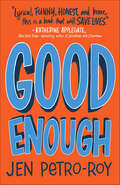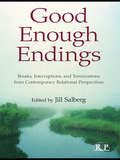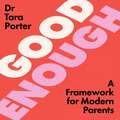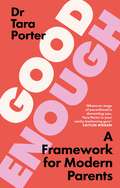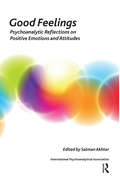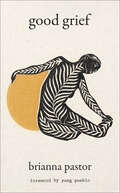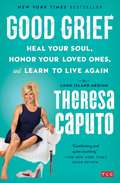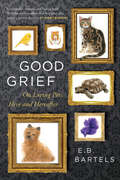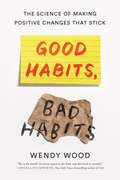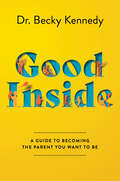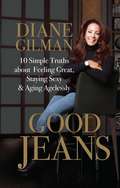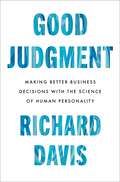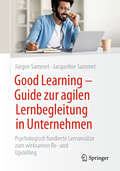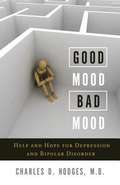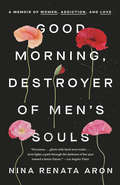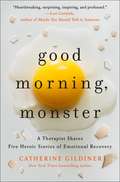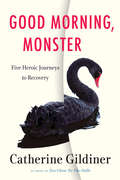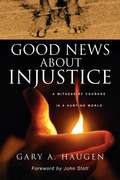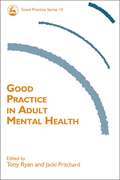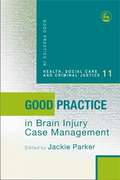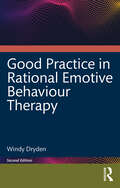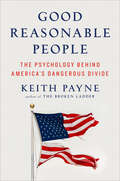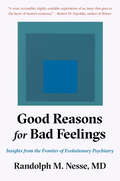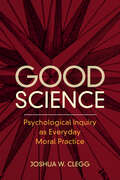- Table View
- List View
Good Enough
by Jen Petro-RoyA young girl with an eating disorder must find the strength to recover in this moving middle-grade novel from Jen Petro-RoyBefore she had an eating disorder, twelve-year-old Riley was many things: an aspiring artist, a runner, a sister, and a friend. But now, from inside the inpatient treatment center where she's receiving treatment for anorexia, it's easy to forget all of that. Especially since under the influence of her eating disorder, Riley alienated her friends, abandoned her art, turned running into something harmful, and destroyed her family's trust. If Riley wants her life back, she has to recover. Part of her wants to get better. As she goes to therapy, makes friends in the hospital, and starts to draw again, things begin to look up. But when her roommate starts to break the rules, triggering Riley's old behaviors and blackmailing her into silence, Riley realizes that recovery will be even harder than she thought. She starts to think that even if she does "recover," there's no way she'll stay recovered once she leaves the hospital and is faced with her dieting mom, the school bully, and her gymnastics-star sister. Written by an eating disorder survivor and activist, Good Enough is a realistic depiction of inpatient eating disorder treatment, and a moving story about a girl who has to fight herself to survive.
Good Enough Endings: Breaks, Interruptions, and Terminations from Contemporary Relational Perspectives (Relational Perspectives Book Series)
by Jill SalbergIn the relational literature, the subject of termination - the ending of an analysis - has received scant attention, and traditional Freudian or ego-psychological criteria are not always enough to assess the readiness to terminate therapy in the coconstructed, intersubjective analytic relationship. Good Enough Endings seeks to remedy this gap, bringing together contributions from contemporary relational thinkers, while at the same time engaging with ideas from other psychoanalytic perspectives. Topics given consideration include: Can there be a relational criteria or paradigm for termination, and what would it include? How do treatment goals of the analyst and/or that of the patient affect the decision to terminate? How do recent developments in attachment theory and research influence the preparation to end analysis? What occurs for the patient after termination, and how do we assess the need for follow-up? Integrating elements of existing psychoanalytic theory with the fruits of the relational turn, Good Enough Endings expands and expounds upon the relational considerations in ending analysis, providing a resource for reflection and insight into the final - and perhaps most difficult - aspect of psychoanalytic treatment.
Good Enough: Break free from the perfection trap and raise happy, self-reliant children - the new parenting guide by the Sunday Times bestselling author
by Dr Tara Porter'Whatever stage of parenthood is dementing you, Tara Porter is your sanity-bestowing guru.' Caitlin Moran'An empathetic and revolutionary approach to parenting.' Julia Samuel We all beat ourselves up with ideas of perfection, but what if 'good enough' parenting is actually enough? Parenting is in need of an update - we are living through unprecedented times and our children are struggling with their mental health. Using an engaging mix of expertise and experience, this book will help you understand what it means to be a 'good enough' parent to your children, from babyhood to adulthood. In return, you'll help instil that feeling of being 'good enough' in your child - a mindset that will give them the best chance of navigating the ups and downs of modern life. As a mother of three and practicing psychologist with over 25 years of clinical experience, Tara Porter is intent on reducing the pressure of modern parenting advice for both parents and children. Break free from scrolling through the latest fads on Instagram and tune into Tara's wise and relatable message.Whether your child is taking their first steps or about to fly the nest, Tara will show you how to find your 'good enough', an approach that allows you to define your own role, avoid parental guilt and espouse an approach of balanced, boundaried emotional support, whilst retaining your sense of sanity and self as you do so.
Good Enough: Break free from the perfection trap and raise happy, self-reliant children - the new parenting guide by the Sunday Times bestselling author
by Dr Tara Porter'Whatever stage of parenthood is dementing you, Tara Porter is your sanity-bestowing guru.' Caitlin Moran'An empathetic and revolutionary approach to parenting.' Julia SamuelReader reviews:'We all know it's impossible to be perfect: perfect children, perfect parents but still we chase the impossible. This book says to stop trying to be perfect. We just need to be good enough. It explains clearly how to do it at different stages of a child's life. The book will work for parents, childcare and teaching professionals alike.' ⭐⭐⭐⭐⭐'Porter honestly talks about her own parenting and professional expertise. She does not shy away from calling out the inconsistencies, soullessness or the unrealistic expectations of many parenting tips, and common practices in our modern world. I enjoyed her focus on love, support, joy, kindness and firmness, being good enough and acceptance of change . . . Very strong and engaging book that makes you feel okay to be good enough.' ⭐⭐⭐⭐⭐We all beat ourselves up with ideas of perfection, but what if 'good enough' parenting is actually enough?Parenting is in need of an update - we are living through unprecedented times and our children are struggling with their mental health. Using an engaging mix of expertise and experience, this book will help you understand what it means to be a 'good enough' parent to your children, from babyhood to adulthood. In return, you'll help instil that feeling of being 'good enough' in your child - a mindset that will give them the best chance of navigating the ups and downs of modern life.As a mother of three and practicing psychologist with over 25 years of clinical experience, Tara Porter is intent on reducing the pressure of modern parenting advice for both parents and children. Break free from scrolling through the latest fads on Instagram and tune into Tara's wise and relatable message.Whether your child is taking their first steps or about to fly the nest, Tara will show you how to find your 'good enough', an approach that allows you to define your own role, avoid parental guilt and espouse an approach of balanced, boundaried emotional support, whilst retaining your sense of sanity and self as you do so.
Good Feelings: Psychoanalytic Reflections on Positive Emotions and Attitudes (The International Psychoanalytical Association Psychoanalytic Ideas and Applications Series)
by Salman AkhtarThis tightly edited volume opens a new vista in psychoanalysis by focusing upon positive and life-enhancing emotions and attitudes. The realms it covers include love, friendship, enthusiasm, courage, tact, resilience, and forgiveness, among others. Seminal papers on these topics have existed but remain scattered throughout the psychoanalytic literature. This book brings them together in a harmonious gestalt. It is more than an anthology, however. Each paper is followed by a freshly written commentary that critically evaluates the paper and brings it in consonance with up-to-date, contemporary psychoanalytic knowledge. Issues of development, adaptation, psychopathology, and analytic technique, as these pertain to the positive dimension of affective experience, are elucidated. The book also deals with the broader and overarching issue of the 'goodness' that accompanies, causes, and is enhanced by the positive emotions in consideration here. Thus the ever-elusive and puzzling issue of psychoanalytic morality finds a place in the discourse, with all its rich and complex theoretical and technical implications.
Good Grief
by Brianna Pastor“Brianna Pastor is by far one of my favorite new writers. Good Grief is a powerful testament that shows how hard the past can be and that overcoming it is possible. If you want to feel seen and deeply moved, read Good Grief. Brianna Pastor has unparalleled talent, let the power of her writing guide you to a better life.”—yung pueblo, #1 New York Times bestselling authorAn expanded edition with over forty brand-new poems of the bestselling poetry collection Good Grief by Brianna PastorWhen Brianna Pastor released her self-published poetry collection, Good Grief, she was blown away by the outpouring of support from people who reached out and said, “Yes. Me too.” For anyone who has struggled with questions of identity or coped with serious emotional issues, including grief, trauma, anxiety, and depression, this collection will help you find hope on the other side.we don’t know how long our pain will last. we assume that because it hurts now, it is probably going to hurt tomorrow. it may even hurt the next day. perhaps it will get worse. but we sleep, and you see, and we do this marvelous thing in our sleep—we mend. And tomorrow is not always what we thought it would be.—from Good Grief
Good Grief: Heal Your Soul, Honor Your Loved Ones, and Learn to Live Again
by Theresa CaputoNew York Times bestselling author Theresa Caputo, star of Long Island Medium and Raising Spirits provides a guide to overcoming grief, filled with inspiring lessons from Spirit and astonishing stories from the clients who have been empowered and healed by her spiritual readings.After more than a decade of being a practicing medium, Theresa Caputo shares the powerful lessons she has learned about grief, healing, and finding happiness in the wake of tragedy. In almost every reading she gives, Spirit insists that people begin to embrace their lives again. But not everyone knows where to start, and putting back together the pieces of a life marked by loss is never easy. Sometimes, you need spiritual guidance—and that&’s where Theresa comes in. With her energetic, positive, and encouraging tone, Theresa uses the lessons from Spirit to guide you through grief toward a place of solace and healing. Each lesson is grounded in her clients&’ experiences of losing loved ones, their encounters with Spirit during readings, and the ways in which they&’ve been able to heal and grow. Each chapter is filled with activities to help you find your &“new normal&”—including journaling, individual and group exercises, meditations, and moments of reflection—based on the truths that Theresa has gathered from Spirit. Good Grief—&“an excellent resource for those who wish to be in communication with deceased loved ones&” (Library Journal)—will help you to feel stronger and more optimistic about what the future has in store for you.
Good Grief: Healing Through the Shadow of Loss
by Deborah Morris CoryellA compassionate guide to the experience of loss as an essential growth process • Explores the nature of loss as a profound mystery shared by all human beings • Offers sensitive and practical advice for experiencing grief and preparing for the healing journey that follows We grieve only for that which we have loved, and the transient nature of life makes love and loss intimate companions. In Good Grief professional grief educator Deborah Morris Coryell describes grief as the experience of not having anywhere to place our love, of losing a connection, an outlet for our emotion. To heal grief we have to learn how to continue to love in the face of loss. In this compassionate guide, Coryell gives inspiring examples of how embracing our losses allows us to awaken our most profound connections to other people. Though our society tends to rank losses in a “hierarchy of grief,” she reminds us that all losses must be grieved in their own right and on their own terms, and that we must honor the “small” losses as well as the “big” ones. Paying attention to even the most minute experiences of loss can help us to be more in tune with our responses to the greater ones, allowing us to once again become part of the rhythm of life from which we have become disconnected.
Good Grief: On Loving Pets, Here and Hereafter
by E.B. BartelsAn unexpected, poignant, and personal account of loving and losing pets, exploring the singular bonds we have with our companion animals, and how to grieve them once they’ve passed.E.B. Bartels has had a lot of pets—dogs, birds, fish, tortoises. As varied a bunch as they are, they’ve taught her one universal truth: to own a pet is to love a pet, and to own a pet is also—with rare exception—to lose that pet in time.But while we have codified traditions to mark the passing of our fellow humans, most cultures don’t have the same for pets. Bartels takes us from Massachusetts to Japan, from ancient Egypt to the modern era, in search of the good pet death. We meet veterinarians, archaeologists, ministers, and more, offering an idiosyncratic, inspiring array of rituals—from the traditional (scattering ashes, commissioning a portrait), to the grand (funereal processions, mausoleums), to the unexpected (taxidermy, cloning). The central lesson: there is no best practice when it comes to mourning your pet, except to care for them in death as you did in life, and find the space to participate in their end as fully as you can.Punctuated by wry, bighearted accounts of Bartels’s own pets and their deaths, Good Grief is a cathartic companion through loving and losing our animal family.
Good Habits, Bad Habits: The Science of Making Positive Changes That Stick
by Wendy WoodA landmark book about how we form habits, and what we can do with this knowledge to make positive changeWe spend a shocking 43 percent of our day doing things without thinking about them. That means that almost half of our actions aren’t conscious choices but the result of our non-conscious mind nudging our body to act along learned behaviors. How we respond to the people around us; the way we conduct ourselves in a meeting; what we buy; when and how we exercise, eat, and drink—a truly remarkable number of things we do every day, regardless of their complexity, operate outside of our awareness. We do them automatically. We do them by habit. And yet, whenever we want to change something about ourselves, we rely on willpower. We keep turning to our conscious selves, hoping that our determination and intention will be enough to effect positive change. And that is why almost all of us fail. But what if you could harness the extraordinary power of your unconscious mind, which already determines so much of what you do, to truly reach your goals?Wendy Wood draws on three decades of original research to explain the fascinating science of how we form habits, and offers the key to unlocking our habitual mind in order to make the changes we seek. A potent mix of neuroscience, case studies, and experiments conducted in her lab, Good Habits, Bad Habits is a comprehensive, accessible, and above all deeply practical book that will change the way you think about almost every aspect of your life. By explaining how our brains are wired to respond to rewards, receive cues from our surroundings, and shut down when faced with too much friction, Wood skillfully dissects habit formation, demonstrating how we can take advantage of this knowledge to form better habits. Her clear and incisive work shows why willpower alone is woefully inadequate when we’re working toward building the life we truly want, and offers real hope for those who want to make positive change.
Good Inside: A Guide to Becoming the Parent You Want to Be
by Dr. Becky Kennedy“This book is for any parent who has ever struggled under the substantial weight of caregiving—which is to say, all of us. Good Inside is not only a wise and practical guide to raising resilient, emotionally healthy kids, it’s also a supportive resource for overwhelmed parents who need more compassion and less stress. Dr. Becky is the smart, thoughtful, in-the-trenches parenting expert we’ve been waiting for!”—Eve Rodsky, New York Times bestselling author of Fair Play and Find Your Unicorn SpaceDr. Becky Kennedy, wildly popular parenting expert and creator of @drbeckyatgoodinside, shares her groundbreaking approach to raising kids and offers practical strategies for parenting in a way that feels good.Over the past several years, Dr. Becky Kennedy—known to her followers as “Dr. Becky”—has been sparking a parenting revolution. Millions of parents, tired of following advice that either doesn’t work or simply doesn’t feel good, have embraced Dr. Becky’s empowering and effective approach, a model that prioritizes connecting with our kids over correcting them.Parents have long been sold a model of childrearing that simply doesn’t work. From reward charts to time outs, many popular parenting approaches are based on shaping behavior, not raising humans. These techniques don’t build the skills kids need for life, or account for their complex emotional needs. Add to that parents’ complicated relationships with their own upbringings, and it’s easy to see why so many caretakers feel lost, burned out, and worried they’re failing their kids. In Good Inside, Dr. Becky shares her parenting philosophy, complete with actionable strategies, that will help parents move from uncertainty and self-blame to confidence and sturdy leadership.Offering perspective-shifting parenting principles and troubleshooting for specific scenarios—including sibling rivalry, separation anxiety, tantrums, and more—Good Inside is a comprehensive resource for a generation of parents looking for a new way to raise their kids while still setting them up for a lifetime of self-regulation, confidence, and resilience.
Good Jeans: 10 Simple Truths about Feeling Great, Staying Sexy & Aging Agelessly
by Diane GilmanTen secrets that help women reinvent and reinvigorate themselves as they approach the over-40 milestone, and beyond.
Good Judgment: Making Better Business Decisions with the Science of Human Personality
by Richard DavisFrom an experienced organizational psychologist comes a unique guide to learning how to better read and understand people and make improved, more informed business decisions about them—including choosing the right employees, fostering relationships in the workplace, resolving conflicts more effectively, and optimizing your performance on the job—using the science of personality.Psychologists widely agree that five key traits define our personalities—intellect, emotionality, sociability, drive, and diligence. Unlike emotions, which are transitory in nature, these traits determine our behaviors, including our motivations, social inclinations, reactions to crisis or complexity, patterns of thinking, and more.Organizational psychologist Dr. Richard Davis is an expert in assessing personalities. He has spent decades advising business leaders and evaluating executives from some of the world’s biggest companies, including Amazon, Target, Best Buy, Under Armour, Meta, Starbucks, Nike, LVMH, and the NBA. Over the course of his career, he has helped numerous executives make tough, highly consequential hiring calls based on personality. A company’s board might want its next CEO to be decisive, focused, and a strong communicator. Investors backing a start-up might want a leader who is not only a visionary but also a team player who doesn’t retaliate when given constructive feedback. That’s where he comes in. As a result of his life’s work, Dr. Davis has developed not only a unique perspective on what human personality is, but an indispensable toolkit for analyzing it, and using the information effectively.In Good Judgment, he brings his expertise to you. Dr. Davis explains what the science of personality is and how it works, and how all of us can use it to improve our working relationships, careers, and lives. Whether you’re a novice manager looking to hire your first assistant, a board member in need of the ideal CEO, an angel investor trying to choose between two different startups, or a new parent selecting a pediatrician, understanding the science of personality and how to utilize it is the key to exercising good judgment—at work and in life.
Good Learning - Guide zur agilen Lernbegleitung in Unternehmen: Psychologisch fundierte Lernansätze zum wirksamen Re- und Upskilling
by Jürgen Sammet Jacqueline SammetGood Learning - kontinuierliches Lernen und gezielte Kompetenzentwicklung - mit agiler Lernbegleitung zu wirksamem Re- und UpskillingDurch konsequente Fort- und Weiterbildung gelingt die Anpassung an die sich immer schneller wandelnden Anforderungen. Doch viele Lerntrends halten nicht, was sie versprechen und versanden wirkungslos.Fern von flüchtigen Moden vermittelt Ihnen dieses Buch bewährte, wissenschaftlich fundierte Lernansätze. Erfahren Sie, wie Sie mit dem Konzept der Agilen Lernbegleitung die drei entscheidenden E`s im betrieblichen Lernen umsetzen: Effektivität, Effizienz und Empowerment.Dieses Buch vermittelt Ihnen handfeste Anwendungsideen für eine zeitgemäße Learning Experience. Damit „Good Learning“ gelingt. Zielgruppen:HR-Verantwortliche, die innovative Lernstrategien implementieren möchten.Learning Professionals, die nachhaltige Lernkulturen schaffen wollen.Trainer:innen, die ihre Angebote an die moderne Lernlandschaft anpassen möchten.Führungskräfte, die die Entwicklung der Mitarbeitenden zielgerichtet unterstützen wollen.Teammitglieder, die für das Team-Lernen verantwortlich sind.Fachexpert:innen, die ihre Expertise weitergeben möchten.
Good Mood, Bad Mood: Help And Hope For Depression And Bipolar Disorder
by Charles HodgesDepression and bipolar disorder are two of the most common diagnoses made in medicine today. Good Mood, Bad Mood; examines whether we are in an epidemic or if we have simply misdiagnosed common sadness as depression. Current research in the medical community seems to indicate that the criteria we use to diagnose depression has resulted in an increased and incorrect labeling of common sadness as depression. While medical treatment is now the commonly accepted way to deal with pain and sadness, its promise has not been fulfilled. In Good Mood, Bad Mood, Dr. Charles Hodges offers an explanation to help the reader see the importance of sadness and the hope that God gives us in His Word.
Good Morning, Destroyer of Men's Souls: A Memoir of Women, Addiction, and Love
by Nina Renata AronA scorching memoir of a love affair with an addict, weaving personal reckoning with psychology and history to understand the nature of addiction, codependency, and our appetite for obsessive love &“The disease he has is addiction,&” Nina Renata Aron writes of her boyfriend, K. &“The disease I have is loving him.&” Their love affair is dramatic, urgent, overwhelming—an intoxicating antidote to the long, lonely days of early motherhood. Soon after they get together, K starts using again, and years of relapses and broken promises follow. Even as his addiction deepens, she stays, convinced she is the one who can get him sober. After an adolescence marred by family trauma and addiction, Nina can&’t help but feel responsible for those suffering around her. How can she break this pattern? If she leaves K, has she failed him? Writing in prose at once unflinching and acrobatic, Aron delivers a piercing memoir of romance and addiction, drawing on intimate anecdotes as well as academic research to crack open the long-feminized and overlooked phenomenon of codependency. She shifts between visceral, ferocious accounts of her affair with K and introspective analyses of the part she plays in his addictions, as well as defining moments in the history of codependency, from the temperance movement to the formation of Al-Anon to more recent research in the psychology of addiction. Good Morning, Destroyer of Men&’s Souls is a blazing, bighearted book that illuminates and adds nuance to the messy tethers between femininity, enabling, and love.
Good Morning, Monster: A Therapist Shares Five Heroic Stories of Emotional Recovery
by Catherine GildinerA Good Morning America SEPTEMBER 2020 READING LIST PICK"Catherine Gildiner is nothing short of masterful—as both a therapist and writer. In these pages, she has gorgeously captured both the privilege of being given access to the inner chambers of people's lives, and the meaning that comes from watching them grow into the selves they were meant to be."—Lori Gottlieb, New York Times bestselling author of Maybe You Should Talk to Someone In this fascinating narrative, therapist Catherine Gildiner’s presents five of what she calls her most heroic and memorable patients. Among them: a successful, first generation Chinese immigrant musician suffering sexual dysfunction; a young woman whose father abandoned her at age nine with her younger siblings in an isolated cottage in the depth of winter; and a glamorous workaholic whose narcissistic, negligent mother greeted her each morning of her childhood with "Good morning, Monster." Each patient presents a mystery, one that will only be unpacked over years. They seek Gildiner's help to overcome an immediate challenge in their lives, but discover that the source of their suffering has been long buried. As in such recent classics as The Glass Castle and Educated, each patient embodies self-reflection, stoicism, perseverance, and forgiveness as they work unflinchingly to face the truth. Gildiner's account of her journeys with them is moving, insightful, and sometimes very funny. Good Morning Monster offers an almost novelistic, behind-the-scenes look into the therapist's office, illustrating how the process can heal even the most unimaginable wounds.
Good Morning, Monster: Five Heroic Journeys to Recovery
by Catherine GildinerA therapist creates moving portraits of five of her most memorable patients, men and women she considers psychological heroes.Catherine Gildiner is a bestselling memoirist, a novelist, and a psychologist in private practice for twenty-five years. In Good Morning, Monster, she focuses on five patients who overcame enormous trauma--people she considers heroes. With a novelist's storytelling gift, Gildiner recounts the details of their struggles, their paths to recovery, and her own tale of growth as a therapist.The five cases include a successful but lonely musician suffering sexual dysfunction; a young woman whose father abandoned her and her siblings in a rural cottage; an Indigenous man who'd endured great trauma at a residential school; a young woman whose abuse at the hands of her father led to a severe personality disorder; and a glamorous workaholic whose negligent mother had greeted her each morning with "Good morning, Monster." Each patient presents a mystery, one that will only be unpacked over years. They seek Gildiner's help to overcome an immediate challenge in their lives, but discover that the source of their suffering has been long buried. It will take courage to face those realities, and creativity and resourcefulness from their therapist.Each patient embodies self-reflection, stoicism, perseverance, and forgiveness as they work unflinchingly to face the truth. Gildiner's account of her journeys with them is moving, insightful, and sometimes humorous. It offers a behind-the-scenes look into the therapist's office and explains how the process can heal even the most unimaginable wounds.
Good News About Injustice: A Witness of Courage in a Hurting World
by Gary A. HaugenGary Haugen says "the good news about injustice is that God is against it!" Offering his own and others' stories alongside proven, practical strategies, he shows how you too can stand against injustice wherever it occurs.
Good Practice in Adult Mental Health
by Tony Ryan Jacki Pritchard David HewittThis text is a guide to good practice within adult mental health care, providing a comprehensive introduction to mental health and illness. It is designed to aid mental health professionals and workers, agencies, and any individuals coming in to contact with mental illness, in recognising a mental health need or problem and offering appropriate support. This is an essential introduction written by practitioners, and also draws from the personal experiences of service users and carers, providing up-to-date and topical material covering major issues such as: * the concepts of mental health, illness and recovery * advocacy and empowerment * legal and policy issues relating to practice * gender and ethnicity in mental health * violence and abuse. The broad range of this book makes it an excellent resource for mental health practitioners, whether experienced or new to the field, support workers, students, and anyone interested in understanding the complexities of mental illness and the mental health system.
Good Practice in Brain Injury Case Management
by Jackie ParkerBrain injury case management involves the care and support of brain-injured individuals and their families in a range of areas, from personal injury litigation to the planning of treatment and therapy regimes. Good Practice in Brain Injury Case Management provides a guide to effective case management, outlining all the key issues that professionals working with brain-injured people will need to know, from understanding what brain injury actually is and how it feels to experience it to strategies for rehabilitation, assessing risk and implementing support plans. The contributors are drawn from a wide range of disciplines, including social work, neuropsychology, occupational therapy and legal practice, and offer information and advice in clear jargon-free. This is an essential handbook for case managers and all other professionals working with brain injured people.
Good Practice in Rational Emotive Behaviour Therapy
by Windy DrydenGood Practice in Rational Emotive Behaviour Therapy does exactly what it promises. It helps the Rational Emotive Behaviour Therapy (REBT) therapist to pinpoint areas of good practice enabling them to make progress towards becoming competent practitioners. Instead of focusing on what not to do in practice, this revised second edition instead emphasises what to do. Covering 101 areas of good practice, this thoroughly updated second edition places emphasis on developing and maintaining the therapeutic alliance, how to outline REBT for potential clients so that they can make an informed decision about whether to engage with the service and how to prepare clients to carry out their tasks in the therapy. A new focus is also placed on online therapy. This highly accessible and practical book is an indispensable guide for anyone embarking on a career in the REBT field.
Good Reasonable People: The Psychology Behind America's Dangerous Divide
by Keith Payne&“An eye-opening analysis of why our politics have become so polarized….Keith Payne illuminates one of the biggest problems of our time and lights the way toward some promising solutions.&” —Adam Grant, #1 New York Times bestselling author of Think Again "Good Reasonable People challenges each of us to drop the weapon of demonization and replace it with something more powerful: a framework for understanding—and for being understood by—people who see the world differently from us." —Margot Lee Shetterly, #1 New York Times bestselling author of Hidden FiguresA leading social scientist explains the psychology of our current social divide and how understanding it can help reduce the conflicts it causesThere has been much written about the impact of polarization on elections, political parties, and policy outcomes. But Keith Payne&’s goal is more personal: to focus on what our divisions mean for us as individuals, as families, and as communities. This book is about how ordinary people think about politics, why talking about it is so hard, and how we can begin to mend the personal bonds that are fraying for so many of us.Drawing upon his own research and his experience growing up in a working class, conservative Christian family in small town Kentucky, Payne argues that there is a near-universal human tendency to believe that people who are different from us are irrational or foolish. The fundamental source of our division is our need to flexibly rationalize ideas in order to see ourselves as good people. Understanding the psychology behind our political divide provides clues about how we can reduce the damage it is causing. It won&’t allow us to undo our polarization overnight, but it can give us the tools to stop going around in circles in frustrating arguments. It can help us make better choices about how we engage in political debates, how policy makers and social media companies deal with misinformation, and how we deal with each other on social media. It can help us separate, if we choose to, our political principles from our personal relationships so that we can nurture both.
Good Reasons for Bad Feelings: Insights from the Frontier of Evolutionary Psychiatry
by Randolph M. NesseA founder of the field of evolutionary medicine uses his decades of experience as a psychiatrist to provide a much-needed new framework for making sense of mental illness.Why do I feel bad? There is real power in understanding our bad feelings. With his classic Why We Get Sick, Dr. Randolph Nesse helped to establish the field of evolutionary medicine. Now he returns with a book that transforms our understanding of mental disorders by exploring a fundamentally new question. Instead of asking why certain people suffer from mental illness, Nesse asks why natural selection has left us all with fragile minds. Drawing on revealing stories from his own clinical practice and insights from evolutionary biology, Nesse shows how negative emotions are useful in certain situations, yet can become overwhelming. Anxiety protects us from harm in the face of danger, but false alarms are inevitable. Low moods prevent us from wasting effort in pursuit of unreachable goals, but they often escalate into pathological depression. Other mental disorders, such as addiction and anorexia, result from the mismatch between modern environment and our ancient human past. And there are good evolutionary reasons for sexual disorders and for why genes for schizophrenia persist. Taken together, these and many more insights help to explain the pervasiveness of human suffering, and show us new paths for relieving it by understanding individuals as individuals.
Good Science: Psychological Inquiry as Everyday Moral Practice
by Joshua W. CleggGood Science is an account of psychological research emphasizing the moral foundations of inquiry. This volume brings together existing disciplinary critiques of scientism, objectivism, and instrumentalism, and then discusses how these contribute to institutionalized privilege and to less morally responsive research practices. The author draws on historical, critical, feminist, and science studies traditions to provide an alternative account of psychological science and to highlight the irreducibly moral foundations of everyday scientific practice. This work outlines a theoretical framework for thinking about and practicing psychology in ways that center moral responsibility, collective commitment, and justice. The book then applies this framework, describing psychological research practices in terms of the their moral dilemmas. Also included are materials meant to aid in methods instruction and mentoring.
